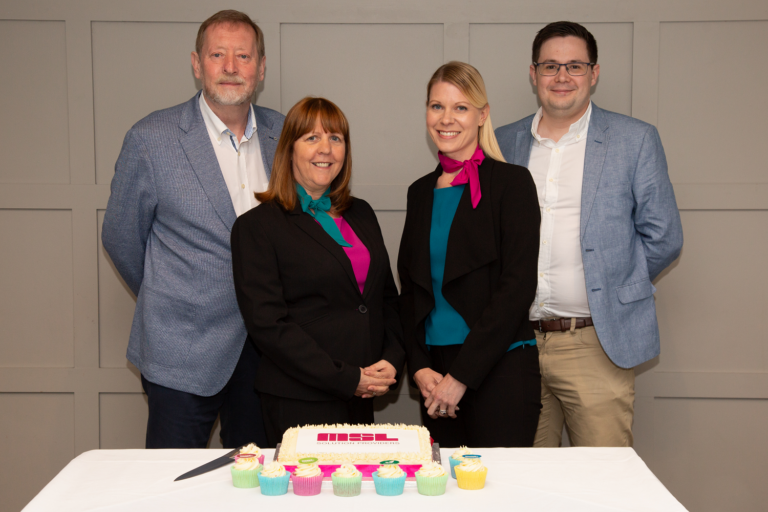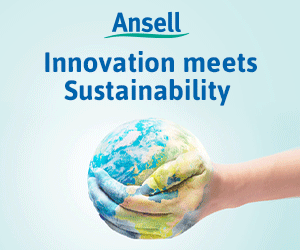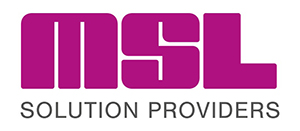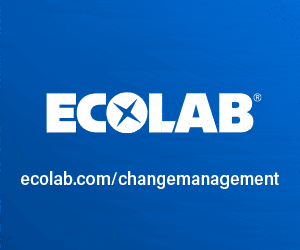Appointed as Managing Director of MSL Solution Providers in the last year, Carolyn Burney has worked her way to the top at the regulatory and laboratory testing service for the cosmetics, personal care, and disinfection markets.
With an academic background in microbiology, Burney left university and went on to gain a wealth of experience in veterinary microbiology, gaining her first role as Assistant Scientific Officer at Veterinary Laboratories Agency, DEFRA. It was here that she got key practical experience in the areas of bacteriology, virology, parasitology, serology, and histology.
Burney’s journey with MSL began in 2015 when she joined as Technical Projects Manager. Then working her way through the ranks, Burney was then promoted to Operations Director, before being picked for the top spot as MD. Throughout her years at the company, she was instrumental in setting up the non-cosmetic microbiology departments, including the biocides efficacy testing and virology testing. A specialism that would fair her well in the unprecedented years following 2020.
My role has somewhat changed in the past year, as I was appointed MD following the retirement of our founder, Angela Davies
Burney explains how her combined technical knowledge of the veterinary and biocides sector, along with her personal and managerial growth, are all key to her role now to inform her decision-making. “I’m also adaptable and able to spot opportunities,” she says about her best traits. “My role has somewhat changed in the past year, as I was appointed MD following the retirement of our founder, Angela Davies. My responsibilities now lie in planning and implementing the company’s business strategies, ensuring financial long-term stability, and maintaining our company profile.”
Speaking about her landmark moments during her time at MSL, Burney talks about the fascinating way the company is owned and managed. “Our transition to an Employee Ownership Trust (EOT) in 2019 [was monemental],” she says. “Over the past 20 years, we have grown to a team of more than 30 people, who now own 51% of the company. A lot of time was spent researching this model of ownership and it has been the perfect solution to ensure the status quo, culture, and job security of our employees. As ‘beneficiaries’, we all have a say in our business, along with an equal share from the profits, and strive to make it the best and most successful it can be.”

However, Burney also gives her expertise to a regulatory body. “For the past 3 years I have also taken a very active role as a member of CEN TC/216 Chemical disinfectants and antiseptics and am now the convenor of the WG2 European Veterinary Standards committee,” she explains. At this, the microbiology expert's responsibilities as convenor include regularly organising and chairing meetings, drafting, and approving European Norms (EN) standards for the veterinary area and representing the working group at National (BSI) and higher-level European standards committee meetings. To further add to her involvement, Burney is also an active member of the ASTM International committee (E35 Pesticides), which involves drafting US standards through the ASTM committees, generating test data, and reviewing drafts.
“Our places on these committees mean that we have awareness and involvement in topical issues which, ultimately, benefits our clients; we can keep them informed with all the latest news and regulations,” the microbiology expert explains. “My previous roles and experience with industry committees and working groups have also required me to coordinate cross-functional teams. All this, combined with the fact that I am naturally a very organised person with good attention to detail, contributes towards MSL’s success.”
For the past 3 years I have also taken a very active role as a member of CEN TC/216 Chemical disinfectants and antiseptics and am now the convenor of the WG2 European Veterinary Standards committee
As a company spread over multiple countries, it is interesting to hear how the MD balances her time. “My time is spent split between managing our two UK sites plus our European office in Dublin. As previously mentioned, I am also Convenor of Working Group 2 for CEN TC/216 – Chemical Disinfectants and Antiseptics, which entails chairing meetings with industry and regulatory representatives from European member states.”
Industry trends: Clean and green
As a decision-making Director, Burney has to keep an eye on trends, capitalising on them when they seem reasonable. This is where the company’s vegan offering began. “Veganism is permeating all areas of people’s lifestyles,” she says. “No longer constrained to what you eat or drink, demand is rising across other industries too, for example, beauty, fashion, and health. So, if there are plant-based alternatives to traditional culture media available that provide the same results at a similar cost, and with the UKAS stamp of approval, why wouldn’t you make the switch [in other areas].”
So in 2019, MSL launched pioneering microbiological testing to replace standard culture media with plant-based or synthetic alternatives to assess the microbiological safety of a product without compromising vegan ethics. “It is proving extremely popular. In fact, demand for it has grown 20% year on year since it launched, and this year, nearly half of the routine testing undertaken has been performed using VeganSure,” she reports.
If there are plant-based alternatives to traditional culture media available that provide the same results at a similar cost, and with the UKAS stamp of approval, why wouldn’t you make the switch [in other areas]
Plant-based is a huge buzzword in the areas of sustainability too, and Burney talks about other ways to ‘be greener’. “Single-use plastics and packaging is an area that definitely demands more attention,” she explains. “But also, UV disinfection is one to watch, being a cleaner and greener method of decontamination.”
Burney says UV disinfection for small and large areas is a sector that MSL is looking to grow in. “We worked closely with the CH/216 committee at The British Standards Institution to develop BS 8628:2022, which came into force earlier this year, and have a purpose-built lab, specially commissioned for this process,” she says.
But there are a few kinks that need to be worked out with UV, as Burney explains.
“Whilst UVC light is certainly harmful to microorganisms, there are many issues with assuming the effectiveness of an emitter based on publications rather than testing,” she says. “For example, is the emitter at a suitable distance to remain effective, does it have the same effect low to the floor as it does directly in front of it, and are the light sources of a suitable power? For cleanroom and sterile environments especially, it is imperative that whole room decontamination systems, such as disinfection devices that use ultraviolet radiation, have proven efficacy.”
The sustainability push is also being seen in the food disinfection sector, as the industry pushes away from using QUATs-based products for disinfection. "We’ve been helping to develop new-style disinfectants, which meet the regulatory requirements in a more sustainable way,” Burney says. “Particularly, there is a trend towards using in-situ and pre-generated hypochlorous acid.”
Industry trends: A quick response
Burney says that in general nowadays, it is a much faster-moving and consumer-led market and talks about an example of this in the antibacterial and antiviral textiles market. “In recent years, many types of fabric, from clothing and bed sheets to face masks, have been developed with protective effects for health and hygiene,” the MD explains. “The demand for such textiles (and therefore the testing of their efficacy) increased hugely during the coronavirus pandemic as consumers searched for products that would minimise their chances of transmitting infection. We are starting to see a similar picture emerge for Monkeypox, given it can be transmitted by touching contaminated materials, such as clothing, bedding, or towels.”
This quick response is characteristic of how the industry moves now. Companies have to be even more prepared, especially considering the ongoing supply chain issues. A commendable way Burney has worked with MSL is to promote using more sustainable consumables and reusable alternatives, where possible. “The whole team are on board with this, and we proactively set targets and spot opportunities to reduce waste.”
Healthy competition
Talking about what she has seen for clients over the last few years, Burney says the first thing a new customer is interested in is price and turnaround time, “obviously!”
It is how you remain competitive in those areas that make up the key part of your business, and Carolyn is proud of what they offer. But there are a few common follow-ups such as interest in accreditation and claims that can be made. For this Burney says they have regulatory consultants that can advise on specific cases according to UK and EU regulations.
Another way Burney and MSL aim to beat out the competition is with another important aspect of a business, communication. “We also pride ourselves on talking in easy-to-understand language; there are lots of technical terms and we avoid jargon wherever possible,” she says. “It is important to us that our customers understand what they need to do to stay compliant.”
Responding to a pandemic
It is interesting to speak to a microbiologist who worked through the pandemic. Burney says she saw the obvious surge in biocide and virology business. “We are proud to have played a role in helping to protect human health during this time of crisis,” she says on this.
However, the pandemic also made other changes that have had huge impacts. A future aim of Burney and MSL is to grow internationally, and the pandemic certainly supercharged this. “Our international profile was raised,” she says. “It made trading with multiple countries and time zones much easier, being able to cover three time zones in one day over zoom or email, whereas pre-pandemic, it was expected that we’d travel for such meetings, which was expensive.”
We also pride ourselves on talking in easy-to-understand language; there are lots of technical terms and we avoid jargon wherever possible
In general, the MD explains that they all had to be adaptable and responsive to keep up with demand. She recalls that the team in the lab was working very long hours to meet the demand and coordinating the customer enquiries was a big logistical task. “We made changes to ensure everyone’s safety. This included some teams working from home, and others being split and coordinated into ’bubbles’,” she explains.“Our staff worked hard during the pandemic, but it allowed us to increase their profit share further.”
She adds that now with the emergence of monkeypox, brands and manufacturers are looking to have their product claims against such threats substantiated. As another enveloped virus, by now MSL is a well-oiled machine.





